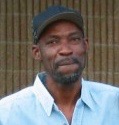 Gregory Bright
Both were arrested on November 15, 1975 and charged with second-degree murder.
On, July 29, 1976, Bright and Truvia went to trial in Orleans Parish District Court. The trial lasted one day. Caston—who used a false name on the witness stand to hide her history of mental illness and criminal behavior – provided the only evidence that implicated Bright and Truvia in the murder. There was no physical evidence linking them to the crime. The murder weapon was never found.
Defense lawyers for Bright and Truvia failed to impeach Caston’s testimony with evidence from the coroner’s report –which indicated that the death occurred at a different time than she testified to – and failed to visit the scene of the crime, which would have revealed that Caston could not have seen the shooting from the spot where she said she was.
After 13 minutes of deliberation, the jury convicted Truvia and Bright of second-degree murder. The judge sentenced them to life in prison without parole.
In 2001, the Innocence Project New Orleans took up their case. At a hearing on a motion for new trial, the Innocence Project showed that prosecutors had withheld critical exculpatory evidence from the defense lawyers. This included a police report naming other suspects in the crime as well as information that Caston was a paranoid schizophrenic who had been in a mental hospital the day before she testified at Bright and Truvia’s trial.
They presented evidence that at the time of the trial, Caston was addicted to heroin, cocaine and amphetamines and had track marks over her entire body. She was had been jailed numerous times in the Orleans Parish Prison and had used eight different aliases.
The lawyers also presented a crime-scene expert who testified that a balcony blocked Caston’s view. They presented a pathologist who said the victim probably was killed four to six hours after Caston said she saw Bright run from the crime scene. And they showed that between police interviews and court testimony, Caston’s story changed several times.
In February 2002, Orleans Parish District Judge Charles Elloie granted the motion for new trial. However, Truvia and Bright remained in prison while the prosecution appealed. In March 2003, the Louisiana Supreme Court upheld Judge Elloie’s ruling.
On June 23, 2003, the Orleans Parish District Attorney dismissed all charges against Bright and Truvia, and said that the behavior of the former District Attorney’s office was “inexcusable.”
The next day, after 27 years in prison, Bright and Truvia were released. Each was given a $10 check from the state of Louisiana and a trash bag filled with their belongings.
Bright and Truvia filed a federal civil rights lawsuit seeking damages for their wrongful convictions. The lawsuit was dismissed in 2012. The state of Louisiana awarded each of them $330,000 in compensation.
In March 2018, Truvia and another person were charged with conspiring to smuggle drugs into the jail in New Orleans. Truvia pled guilty and was sentenced to probation.
–Charles Armbrust
|